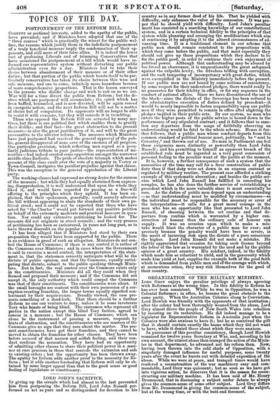LORD JOHN'S SACRIFICE.
Isr giving up the scruple which had almost to the last prevented him from postponing the Reform Bill, Lord John Russell per- formed an act as pure and as distinguished for devotion to his
country as in any former deed of his life. That he yielded with difficulty, only enhances the value of the concession. It was pro- per that he should yield with difficulty. Lord John's peculiar merit has consisted in a searching knowledge of our constitutional system, and in a certain technical fidelity to the principles of that system while planning and arranging the modifications which aim at continuing it by adapting it to the altered circumstances of ad- vancing time. It is a traditional element in our scheme that public men should remain consistent to the propositions with which they come before the public, and that most especially they should not give up those propositions which they declare to be for the public good, in order to continue their own enjoyment of political power. Although that understanding may be abused by too literal an observance, it is unquestionably the great safeguard against the culpable levity, the frivolous trifling with corruption, and the rash tampering of incompetency with great duties, which were exemplified in the Ministry, immediately before the present. If our public men are not bound by some notions of consistency, by some respect for their understood pledges there would really be no guarantee for their fidelity in office, or for any sequence in the conduct of national affairs. Since we have discontinued the use of the block—since the dictate of the Sovereign has been reduced to the administrative execution of duties defined by precedent—it would be nearly impossible to fasten responsibility upon our public men if they were permitted to remain in office after slighting the pledges implied in their public acts. By our system, no man who enters the higher posts of the public service is bound down to the performance of any stipulated contract ; and it follows that to sanc- tion any departure from the usage of faithfully observing an understanding would be fatal to the whole scheme. Hence it fur- ther follows, that a public man whose conduct departs from this common standard of political honour must, politically, be "sent to Coventry," and thrown out of use. No man in Parliament can feel these exigencies more distinctly or powerfully than Lord John Russell ; and his permitting to himself an apparent breach of the established rule must be regarded as a very great concession of personal feeling to the peculiar want of the public at the moment.
It is, however, a further consequence of such a system that the necessities of the time may call for a freer construction of public duty than if that duty were set down in an express contract or regulated by military routine. The present case afforded a striking example of this systematic aberration; and besides the public ser- „vice which Lord. John Russell has fulfilled in conceding his scruples, he has also done the further service of reestablishing a precedent which is the more valuable since it must essentially be rare. As the duties of public men depend upon an understanding —as that understanding must be modified by circumstances—as the individual must be responsible for the accuracy or error of the interpretation—it calls for a great moral courage in the man viho has an opportunity like that presented to Lord John Russell, of choosing between the set routine and that de- parture from routine which is warranted by a higher con- struction of honour than the ordinary code of honour can supply. It was an occasion upon which to make a mis- take would blast the character of a public man for ever; and precisely because the penalty would have been so severe, is the merit of incurring risk upon the dictate of a pure conscience the higher. Lord John Russell did not snake a mistake. He rightly appreciated that occasion for taking such licence beyond the letter of the law as is warranted by the need and by the public opinion of a great country. His conduct, indeed, in the fidelity which made him so reluctant to yield, and in the generosity which made him yield at last, supplies the example both of the good faith which is demanded from public men and of the courage with which, at momentous crises, they may risk themselves for the good of their country.


























 Previous page
Previous page